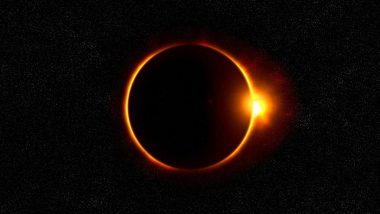A total solar eclipse or Surya Grahan, a celestial marvel where the moon entirely obscures the sun, is set to captivate sky-gazers in the upcoming month of April. This rare occurrence allows individuals within the centre of the Moon's shadow to experience a complete blackout of the Sun's face. NASA emphasises that during this unique event, viewers can briefly remove their specialised eclipse glasses, distinct from regular sunglasses, when the Moon fully obstructs the Sun. Lunar Eclipse 2024 Date Falls on Holi: Will Holi Chandra Grahan Be Visible in India? Know the Exact Date, Time, Visibility and Other Details.
Solar Eclipse 2024 Timing and Date
Scheduled for Monday, April 8, 2024, the total solar eclipse is predicted to last between three to four minutes for observers in the path of totality. The total solar eclipse will commence over the South Pacific and reach Mexico's Pacific coast at approximately 11:07 am Pacific Time (12:37 am IST) before traversing the United States through states like Texas, Oklahoma, Arkansas, and more. The eclipse's path extends into Canada, concluding on the Atlantic coast of Newfoundland by 5:16 pm Newfoundland Time.
Will Surya Grahan Be Visible in India
Contrary to the excitement surrounding the Surya Grahan, reports confirm that the total solar eclipse of 2024 will not be visible in India. Despite the disappointment of Indian skywatchers, scientists emphasise the rarity of such occurrences.
How to Safely Watch the Total Solar Eclipse 2024?
NASA advises against direct viewing of the eclipse except during the brief total phase. Proper eye protection, such as eclipse glasses or indirect viewing methods like projecting the Sun's image on a whiteboard using a telescope, ensures safety. Eye filters like black polymer, aluminised Mylar, or welding glass of shade number 14 are suitable for observation. Eclipse glasses remain a reliable choice for viewing the solar spectacle.
As the eagerly anticipated total solar eclipse of 2024 approaches, enthusiasts are urged to prepare telescopes and mark their calendars for this celestial event. Safety precautions are paramount, and with the right protective measures, viewers worldwide can indulge in the breathtaking spectacle of the moon momentarily shrouding the radiant face of the sun. While India might miss this particular eclipse, the anticipation and wonder surrounding such astronomical events continue to unite sky enthusiasts globally.
(The above story first appeared on LatestLY on Feb 05, 2024 01:31 PM IST. For more news and updates on politics, world, sports, entertainment and lifestyle, log on to our website latestly.com).













 Quickly
Quickly


